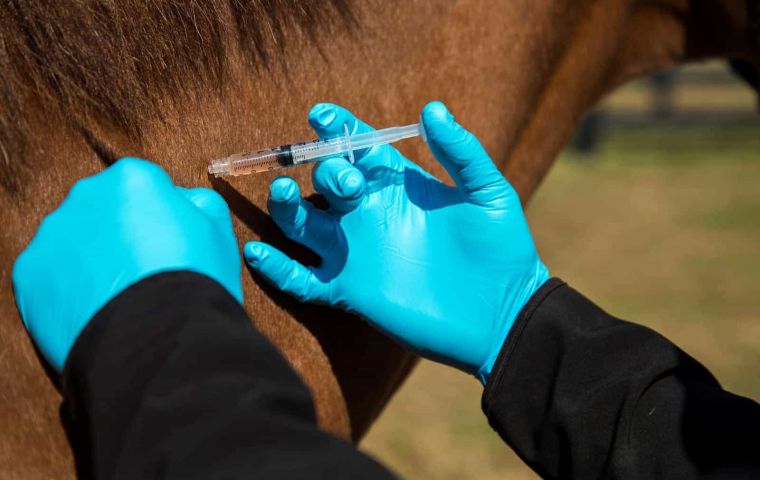MercoPress. South Atlantic News Agency
More than 320 cases of equine encephalomyelitis detected in 7 Argentine provinces
 Vaccines are available, Senasa said
Vaccines are available, Senasa said Argentine health authorities have confirmed the detection of over 320 cases of equine encephalomyelitis, a malady that is transmitted through mosquito bites and is spreading rapidly nationwide and also onto neighboring Uruguay.
The disease, which might rarely affect humans, is considered an “international public health threat” because of its “high potential to cross borders”, according to the World Health Organization (WHO).
In this scenario, Argentina's National Service of Animal Health and Agrifood Quality (Senasa) reported that there were 324 outbreaks of equine encephalomyelitis in 7 of the country's 24 provinces. In addition, at least 35 animals have died.
In cases of infection with the Western variant, humans do not usually show signs, as it develops very mildly in adults and with very few deaths. Symptoms include fever, chills, headache, nausea, vomiting, and loss of appetite.
Meanwhile, in equines, the mortality rate can reach 90% in the case of the Eastern Equine Encephalitis variant, and is between 20 to 30% for Western Equine Encephalitis, while the rest of those affected can convalesce and, in some cases, be left with sequelae.
Most infections result in mild clinical symptoms while patients with neurological signs require close monitoring, it was explained.
The affected animals were found in the provinces of Buenos Aires, Chaco, Corrientes, Córdoba, Santa Fe, Formosa, and Entre Ríos. In addition, there are samples under study from the provinces of Neuquén, Mendoza, Misiones, and Santiago del Estero.
In September 2016, Senasa ordered that vaccination was up to the animal's owner or treating veterinarian. However, given the latest episodes, organizers of events involving horses should require their vaccination 15 days prior to the displacement.
Senasa also confirmed Monday the arrival of 300,000 doses of equine encephalomyelitis vaccine -Eastern and Western variants- and hoped availability would increase in the coming days.
Distribution priority will be given to the districts with the highest number of positive notifications and to areas with favorable ecological conditions for the presentation of the virus and the registration of equine stocks.
Vaccination must be carried out by licensed veterinarians who must sign the animal's documents. Animals vaccinated for the first time need a booster dose between 3 and 4 weeks later. The vaccine is valid for one calendar year and the antibodies reach protection level 14 days after injection. Convalescent or recovered animals that have shown neurological symptoms or those in which the disease has been confirmed should not be inoculated.




Top Comments
Disclaimer & comment rulesCommenting for this story is now closed.
If you have a Facebook account, become a fan and comment on our Facebook Page!